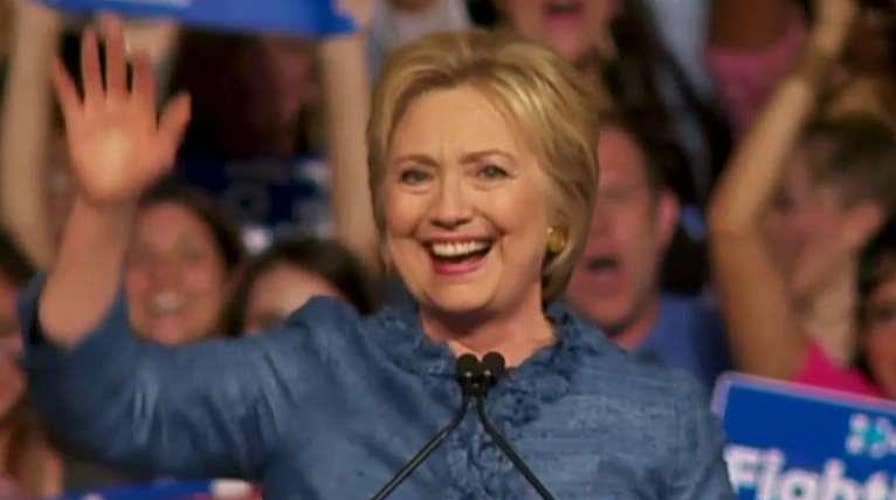Clinton: You voted for tomorrow to be better than yesterday
Democratic presidential frontrunner addresses supporters after wins in North Carolina, Ohio and Florida
Hillary Clinton cemented her front-runner status and moved ever-closer to the Democratic nomination on Tuesday with wins over Sen. Bernie Sanders in at least four delegate-rich states -- including the hard-fought Ohio primary.
The former secretary of state also swept to victory in Florida and North Carolina and held off Sanders in Illinois, helping her recover after Sanders’ upset win in Michigan last week. She also led Sanders by just over 1,500 votes with 99 percent of precincts reporting in the Missouri primary Wednesday morning, but that race was too close to call.
“This was another Super Tuesday for our campaign,” Clinton said at a victory party in West Palm Beach, Fla. “Thank you, Florida. Thank you, North Carolina. Thank you, Ohio.”
Clinton predicted that she would pick up roughly 300 delegates by the end of the night.
“We are very close to winning the Democratic Party nomination and winning the election in November,” she said.
The Democratic candidates were competing Tuesday for a total of 691 delegates across the five states. Florida was the biggest prize with 214 delegates, followed by Illinois with 156, Ohio with 143, North Carolina with 107 and Missouri with 71.
Clinton’s Florida and North Carolina wins completed her sweep of Southern states.
Sanders gave no indication that he would leave the race despite Tuesday’s losses. He had hoped for a Michigan-style upset in Ohio after several polls showed him narrowly trailing in the Buckeye State.
In the days before the voting, Sanders touted his support for free trade, while hitting Clinton for supporting NAFTA, or the North American Free Trade Agreement, of the 1990s. More than half of Democratic and Republican voters in Michigan said free trade takes away jobs, according to exit polls.
"The result is the loss of millions of decent paying jobs and a race to the bottom," Sanders said during a recent campaign stop in Cleveland.
“We have come a long way,” Sanders said at an hour-long rally in Phoenix, where he continued to spread his message of prosperity and inclusiveness. “We have done something very radical in American politics. We have told the truth.”
Sanders touted a plan that includes free universal health care, increasing the federal minimum wage to $15 an hour and citizenship for illegal immigrants. And he vowed to use executive authority to bypass Congress if elected president.
Sanders also continued his attacks on Clinton, portraying her as Wall Street’s preferred candidate. And he declared that Republican frontrunner Donald Trump “will never be president.”
Clinton has been the Democratic front-runner since she entered the race about a year ago. After Tuesday's results, she has 1,488 delegates, compared to 704 for Sanders, with 2,383 needed to secure the party nomination. Clinton has won 15 primaries or caucuses compared to seven for Sanders.
However, the Vermont senator and self-described Democratic socialist has mounted an enduring insurgent campaign based on a populist message that has painted Clinton as a Wall Street and Washington insider.
In her victory speech, Clinton also hammered home her core agenda, including equal pay for women and national security, while embracing the issues that appear most important to voters -- including a free college education, free trade, reining in Wall Street and more and better jobs “as a ticket to the middle class.”
Clinton also continued to turn her focus toward the general election and a potential contest against Trump.
“Our next president of the United States must defend our country, not embarrass it,” Clinton said, in an apparent reference to Trump’s occasionally unfiltered rhetoric. “There’s nothing we can’t accomplish.”













































